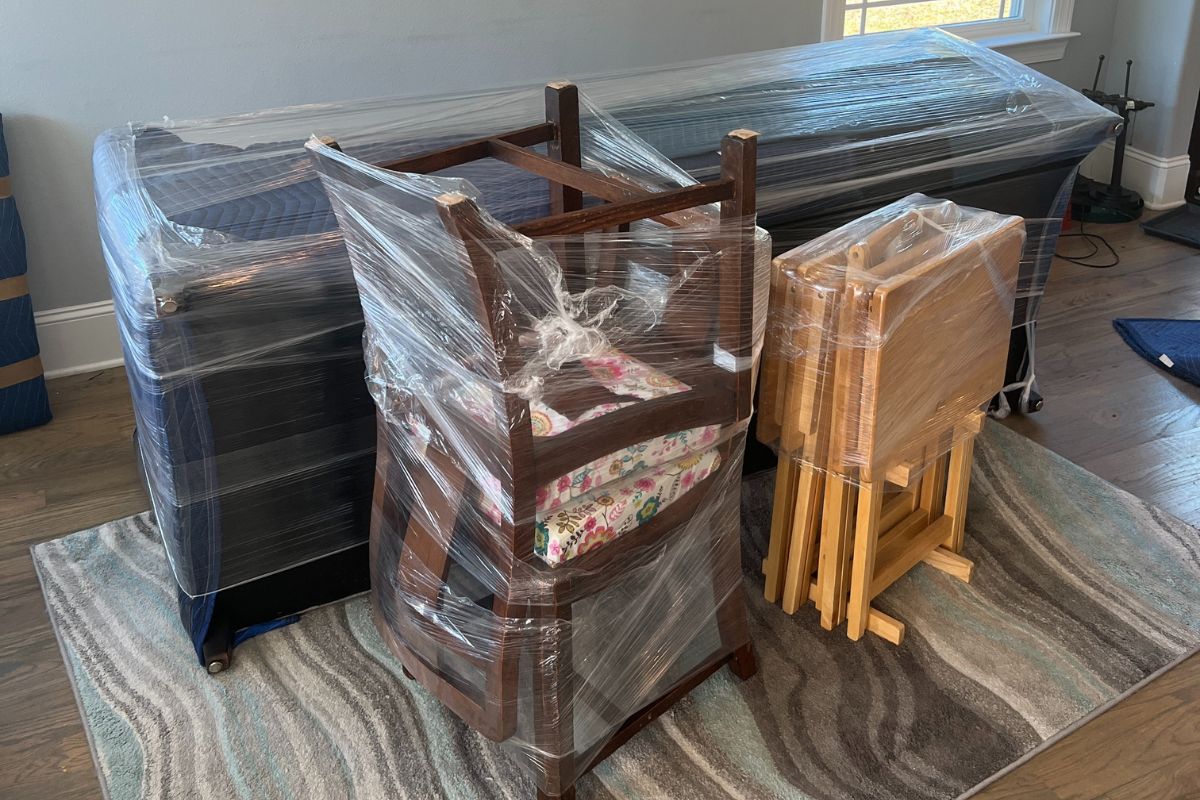Moving isn’t just relocating to a new place, it’s relocating your entire existence.
The books you’ve read, dishes from countless meals shared with friends, knick-knacks collected over years – all packed into cardboard containers.
You’re not alone if this feels daunting. Packing up every last bit of your current life and setting it up somewhere new is no easy task.
But what if I told you that with the right plan and tips, moving could become less about stress and more about anticipation?
How to prepare for a move is more than just packing boxes. It involves decluttering and parting with old items, while cherishing the memories they hold.
You’ll need to decide whether it’s smarter financially and logistically to hire professional movers or handle the move yourself.
Additionally, understanding how best to pack precious belongings safely is key.
Understanding the Moving Process
Moving is no easy task. It’s often tagged as one of life’s most stressful events, but with proper preparation and an organized moving timeline, it can be manageable.
A well-thought-out moving checklist is your secret weapon against chaos on moving day. Not just does it assist you in staying organized through the whole process, but also guarantees that nothing is forgotten.
The first step towards successful relocation involves crafting a comprehensive plan that spans from sorting belongings to unpacking at your new place.
Importance of a Detailed Checklist
Detailed checklists help streamline tasks and reduce stress levels by keeping track of all necessary steps.
This includes notifying utility companies about changes, purchasing packing supplies like bubble wrap or boxes early enough to avoid last-minute panic buying, and scheduling time for decluttering before you start packing.
You don’t need superpowers to master this; just determination and perhaps some coffee. Remember – every minute spent planning saves ten in execution.
Setting Your Budget
A crucial step in the moving process is setting your budget. It’s not a simple undertaking, however doing as such can assist you with cutting costs during the move. Whether you decide to hire professional movers or embark on a DIY move depends largely on your budget and the distance of your move.
If hiring professionals, remember that different moving companies offer various services at diverse price points. For example, some might just load and unload your boxes while others could pack items for you too – it all comes down to what fits within your financial plan.
Now if going DIY seems more appealing due to cost considerations, bear in mind there are still expenses involved like packing materials (bubble wrap anyone?), truck rental fees and possibly even taking time off work. So make sure you’ve accounted for these when determining how much cash will be needed for this venture.
You don’t want any surprises popping up last minute because trust us – they never come cheap.
Pro Tip: Hiring professional movers may be more affordable than you thought! Request a Free Quote and we’ll be happy to provide you with a fair estimate.
Sorting Through Belongings and Decluttering
The moving process starts with sorting through your belongings. It’s the perfect time to declutter, saving you packing time and creating more space in the moving truck.
Selling unwanted items online or hosting a garage sale is an excellent way to lighten your load. Not only can decluttering save money on moving costs, but it may also generate some extra income.
Effective Ways to Declutter
To start decluttering, separate items into categories: keep, sell, donate. Items that are no longer needed or used should be sold or donated.
You’d be surprised at how much value lies hidden within your home. There are apps available like Facebook Marketplace and OfferUp where you can sell items easily.
If selling isn’t for you but you still want those unwanted items out of sight, consider donating them. Charities such as Goodwill accept gently used goods – from clothing to furniture- helping someone else while reducing clutter before your move.
Packing Tips From Moving Pros
Bubble wrap and packing paper are indispensable when it comes to protecting fragile items. Bubble wrap provides cushioning while packing paper prevents scratches among delicate pieces.
In addition to these basics, consider using towels or linens as padding material – an easy way to save money without compromising safety. Don’t forget markers too; labeling will be a lifesaver during unpacking.
Remember, you can never have enough tape either. Make sure you get enough rolls because running out mid-pack is far from ideal.
Organizing and Labeling Your Boxes
Staying organized during a move is not an easy task. But, with smaller boxes, you can make the process smoother. Pack similar items together to avoid confusion later on.
Packing by room or category lets you keep track of your belongings more efficiently. So start putting all kitchen utensils in one box, books from the living room in another – it’s simple but effective.
A neat trick that professional movers often use is color-coding each box based on its corresponding room. This strategy helps quick identification during unpacking and saves time significantly.
Pack Personal Essential Items Seperately
The idea of packing essentials separately might seem trivial now but trust us, when moving day arrives and everything else is packed away in countless boxes; this little bag will be your lifeline. It should contain important documents, medications if any, a change of clothes maybe even some snacks too because hey who wants to rummage through stacks just for a snack?
Preparing Large and Fragile Items
Getting ready for a move involves more than just packing boxes. It’s about securing your belongings, especially large and fragile items like heavy dressers or glassware.
Start by emptying dresser drawers to lighten the load. Not only does this make moving easier, but it also prevents potential damage from shifting contents during transit.
To ensure the safe transit of your furniture, consider these tips for proper packing.
Fragile items need extra care. Bubble wrap is a great tool for keeping these precious pieces safe during the journey. But don’t forget to label them as ‘fragile’ so movers know they should handle with care.
When dealing with large items such as appliances or complex electronics, taking pictures of wiring setups before you disconnect them can save you hours of frustration later on when setting up in your new home. This guide provides step-by-step instructions on preparing electronic devices for relocation.
Notifying Utility Companies & Changing Address
Moving to a new home is not just about packing and transportation. It also involves some paperwork, like updating your address with utility companies and relevant institutions.
You might be wondering why it’s important. Well, wouldn’t it be a drag to settle into your new home without electricity or water? Plus, missing bills due to an outdated mailing address can lead to late fees.
To start the process of notifying your utility companies, get in touch with them at least two weeks before moving day. This ensures that they have enough time for the switch over.
But what about changing addresses elsewhere?
- Your voter registration needs an update too because where you live affects where you vote.
- The DMV should know your current location so that any communication related to driver’s license gets sent properly.
Note: Many people overlook this step but trust me; these are crucial when moving. So take my advice: set aside some time from all those packing chores and make sure everything’s updated.
Arranging Transportation
If you’re preparing for a move, deciding on the right transportation is like choosing your trusty steed. Whether it’s a moving truck or considering a rental, this decision could make or break your moving day.
Moving trucks are often preferred because they offer ample space to safely transport all of your belongings. You can pack everything neatly and securely in one go, making the moving process smoother. But before jumping in headfirst into booking that giant vehicle, ask yourself if you need such capacity?
Rental trucks are another option especially when trying to stick to budget moving goals. They give more flexibility with size choices which may help save money depending on the scale of your move.
A great tip here is starting early. Don’t wait until it’s crunch time before sorting out how you’ll be transporting your life from point A to B. This is especially important when you’re moving to Tallahassee or the surrounding area, because there is a large volume of students moving in and out each year, and things book up fast.
Be proactive; reserve ahead so that come D-day there aren’t any nasty surprises waiting around the corner.
In conclusion: arranging transportation might not seem like an exciting part of planning a move but believe me when I say this – it holds paramount importance in ensuring everything else falls into place seamlessly.
FAQs in Relation to How to Prepare for a Move
How do I start preparing for moving?
Begin by creating a comprehensive checklist and timeline. This will help you stay organized and ensure no task is overlooked.
How soon to start preparing for a move?
You should ideally kick off your preparations about 8 weeks prior to the big day. The more time you give yourself, the less stressful it’ll be.
How do you declutter before moving?
Purge through your belongings, deciding what’s worth keeping. Sell, donate or trash anything unnecessary – this lightens your load significantly.
Conclusion
Mastering how to prepare for a move isn’t an overnight thing. It’s about starting early, staying organized and ticking off tasks from your moving checklist.
Packing becomes less of a chore when you declutter first. Remember the thrill of unearthing forgotten treasures? Channel that energy into sorting out items to sell, donate or trash.
Hiring professional movers or doing it yourself is a big decision – one influenced by your budget and distance of the move. Consider this before diving in headfirst.
Remember: Moving doesn’t have to be overwhelming. With these tips, make it more anticipation than stress!

